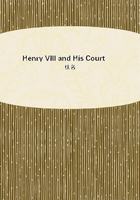
第108章 INTRIGUES.(1)
For a few days past the king's gout had grown worse, and, to his wrath and grief, it confined him as a prisoner to his rolling chair.
The king was, therefore, very naturally gloomy and dejected, and hurled the lightnings of his wrath on all those who enjoyed the melancholy prerogative of being in his presence. His pains, instead of softening his disposition, seemed only to heighten still more his natural ferocity; and often might he heard through the palace of Whitehall the king's angry growl, and his loud, thundering invectives, which no longer spared any one, nor showed respect for any rank or dignity.
Earl Douglas, Gardiner, and Wriothesley very well knew how to take advantage of this wrathful humor of the king for their purposes, and to afford the cruel monarch, tortured with pain, one satisfaction at least--the satisfaction of making others suffer also.
Never had there been seen in England so many burnt at the stake as in those days of the king's sickness; never had the prisons been so crowded; never had so much blood flowed as King Henry now caused to be shed. [Footnote: During the king's reign, and at the instigation of the clergy, twenty-eight hundred persons were burnt and executed, because they would not recognize the religious institutions established by the king as the only right and true ones.--Leti, vol.
i, p. 34.] But all this did not yet suffice to appease the blood-thirstiness of the king, and his friends and counsellors, and his priests.
Still there remained untouched two mighty pillars of Protestantism that Gardiner and Wriothesley had to overthrow. These were the queen and Archbishop Cranmer.
Still there were two powerful and hated enemies whom the Seymours had to overcome; these were the Duke of Norfolk and his son, the Earl of Surrey.
But the various parties that in turn besieged the king's ear and controlled it, were in singular and unheard-of opposition, and at the same time inflamed with bitterest enmity, and they strove to supplant each other in the favor of the king.
To the popish party of Gardiner and Earl Douglas, everything depended on dispossessing the Seymours of the king's favor; and they, on the other hand, wanted above all things to continue in power the young queen, already inclined to them, and to destroy for the papists one of their most powerful leaders, the Duke of Norfolk.
The one party controlled the king's ear through the queen; the other, through his favorite, Earl Douglas.
Never had the king been more gracious and affable to his consort--never had he required more Earl Douglas's presence than in those days of his sickness and bodily anguish.
But there was yet a third party that occupied an important place in the king's favor--a power which every one feared, and which seemed to keep itself perfectly independent and free from all foreign influences. This power was John Heywood, the king's fool, the epigrammatist, who was dreaded by the whole court.
Only one person had influence with him. John Heywood was the friend of the queen. For the moment, then, it appeared as if the "heretical party," of which the queen was regarded as the head, was the most powerful at court.
It was therefore very natural for the popish party to cherish an ardent hatred against the queen; very natural for them to be contriving new plots and machinations to ruin her and hurl her from the throne.
But Catharine knew very well the danger that threatened her, and she was on her guard. She watched her every look, her every word; and Gardiner and Douglas could not examine the queen's manner of life each day and hour more suspiciously than she herself did.
She saw the sword that hung daily over her head; and, thanks to her prudence and presence of mind, thanks to the ever-thoughtful watchfulness and cunning of her friend Heywood! she had still known how to avoid the falling of that sword.
Since that fatal ride in the wood of Epping Forest, she had not again spoken to Thomas Seymour alone; for Catharine very well knew that everywhere, whithersoever she turned her steps, some spying eye might follow her, some listener's ear might be concealed, which might hear her words, however softly whispered, and repeat them where they might be interpreted into a sentence of death against her.
She had, therefore, renounced the pleasure of speaking to her lover otherwise than before witnesses, and of seeing him otherwise than in the presence of her whole court.
What need had she either for secret meetings? What mattered it to her pure and innocent heart that she was not permitted to be alone with him? Still she might see him, and drink courage and delight from the sight of his haughty and handsome face; still she might be near him, and could listen to the music of his voice, and intoxicate her heart with his fine, euphonious and vigorous discourse.
Catharine, the woman of eight-and-twenty, had preserved the enthusiasm and innocence of a young girl of fourteen. Thomas Seymour was her first love; and she loved him with that purity and guileless warmth which is indeed peculiar to the first love only.
It sufficed her, therefore, to see him; to be near him; to know that he loved her; that he was true to her; that all his thoughts and wishes belonged to her, as hers to him.
And that she knew. For there ever remained to her the sweet enjoyment of his letters--of those passionately written avowals of his love. If she was not permitted to say also to him how warmly and ardently she returned this love, yet she could write it to him.